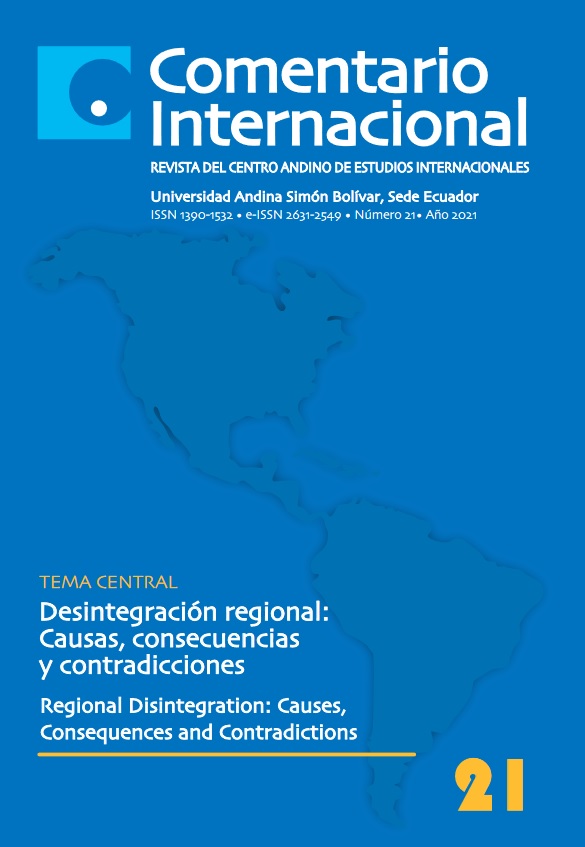¿Brexit, Englixit? Desintegración y cómo recuperar el control significa renunciar a él
Contenido principal del artículo
Resumen
Esta contribución busca explorar lo que la desintegración puede significar para un idioma, enfocado específicamente en el Brexit. Las diferencias lingüísticas suelen ser una de las principales razones por las cuales la desintegración sucede; sin embargo, en el caso del Brexit, el idioma inglés se verá afectado debido a la decisión del Reino Unido de dejar la Unión Europea. El inglés no será el idioma oficial de ninguno de los Estados miembro europeos (es el segundo idioma oficial de Malta e Irlanda, más no el primero). Esto tiene repercusiones políticas y legales importantes, que afectarán el futuro del idioma en la UE después del Brexit. Basados en investigación documental, vemos dos avenidas para el futuro del idioma inglés en la UE: podría ser reemplazado por otro de los idiomas más utilizados, como el alemán o el francés, o podría convertirse en la auténtica lingua franca europea. La segunda opción parece muy viable, ya que es un idioma muy hablado por la juventud europea. No obstante, al dejar la UE y recuperar el control sobre sus decisiones, los británicos perderán el control sobre el idioma inglés. Esta tendencia ya había sido observada en varios países fuera de la UE, pero se acelerará dentro de ella, después del Brexit.
##plugins.themes.bootstrap3.displayStats.downloads##
Detalles del artículo
Sección

Esta obra está bajo una licencia internacional Creative Commons Atribución-NoComercial 4.0.
Los autores que publiquen en esta revista aceptan las siguientes condiciones:
1. Los autores conservan los derechos de autor y ceden a la revista Comentario Internacional el derecho de la primera publicación, con el trabajo registrado con la licencia de atribución de Creative Commons, que permite a terceros utilizar lo publicado siempre que mencionen la autoría del trabajo y a la primera publicación en esta revista.
2. Los autores pueden realizar otros acuerdos contractuales independientes y adicionales para la distribución no exclusiva de la versión del artículo publicado en esta revista (p. ej., incluirlo en un repositorio institucional o publicarlo en un libro) siempre que indiquen claramente que el trabajo se publicó por primera vez en Comentario Internacional.
Cómo citar
Referencias
Adams, Richard. “Learning Foreign Languages Should Be Compulsory, Says Report”. The Guardian. January 9th, 2020. https://bit.ly/400BbGL.
Alesina, Alberto, and Enrico Spolaore. The Size of Nations. Cambridge, US: MIT Press, 2003.
Bolton, Kingsley, Werner Botha and Andy Kirkpatrick, eds. The Handbook of Asian Englishes. Hoboken, US: John Wiley and Sons, 2020.
—, and Daniel Davis. “Brexit and the Future of English in Europe”. World Englishes 36, n.° 3 (2017): 302-12. https://doi.org/10.111/weng.12263.
Bourdieu, Pierre. Distinction: A Social Critique of Taste. London: Routledge, 1984.
—. Sociology in Question. London: Sage, 1993.
Bugarski, Ranko. “Language, Nationalism and War in Yugoslavia”. International Journal of the Sociology of Language 151 (2001): 69-87. https://doi.org/10.1515/ijsl.2001.048.
Council of the European Communities. Regulation No 1: Determining the Languages to Be Used by the European Economic Community. October 6th, 1958. 358/58.
Dallison, Paul. “Mario Monti: EU Should Adopt English Post Brexit”. Politico. November 21st, 2017. https://politi.co/422mUel.
European Union. Treaty on the Functioning of the European Union. March 1st, 2020.
Gazzola, Michele. “Multilingual Communication for Whom?: Language Policy and Fairness in the European Union”. European Union Politics 17, n.° 4 (2016): 546-69. https://doi.org/10.1177/1465116516657672.
Goulard, Hortense. “English Will Not Be an Official EU Language after Brexit, Says Senior MEP”. Politico. June 27th, 2016. https://politi.co/2BrTpqX.
Hong Kong. The Basic Law of the Hong Kong Special Administrative Region of the People’s Republic of China. May 2021. https://bit.ly/3Fhb4U5. India. The Constitution of India. May 2022. https://bit.ly/3yAC3py.
Iskra, Katarzyna. “Language Policy”. European Parliament. April 2022. https://bit.ly/3YxPGAA. Jacobsen, Ushma. “English in the European Union after Brexit: Inclusion Effects of a Language without an Owner”. Culture, Practice and European Policy 2, n.° 1 (2017): 9-11. https://bit.ly/3yzkfuY.
Krzy?anowski, Micha?, and Ruth Wodak. “Political Strategies and Language Policies: The European Union Lisbon Strategy and Its Implications for the EU’s Language and Multilingualism Policy”. Language Policy 10, n.° 1 (2011): 115-36. https://doi.org/10.1007/s10993-011-9196-5.
Mackey, Robert. “French President Emmanuel Macron Offers Refuge to American Climate Scientists”. The Intercept. June 1st, 2017. https://bit.ly/3Js6aWB.
McLoughlin, Bill. “EU Humiliation: Brussels Forced to Keep English as Official Language Despite UK’s Exit”. Express. September 28th, 2020. https://bit.ly/3Lh3tIY.
Modiano, Marko. “English in a Post-Brexit European Union”. World Englishes 36, n.° 3 (2017): 313-27. https://doi.org/10.1111/weng.12264
Mollin, Sandra. Euro-English: Assessing Variety Status. Tübingen, DE: Gunter Narr Verlag Tübingen, 2006.
O’Dubhghaill, Sean. “‘It’s Fake—I mean It Sounds the Same, but It’s Fake’: Plasticity, Simulation and Passing through the Irish Language in Belgium”. Irish Journal of Anthropology 17, n.° 1 (2014): 46-51. https://bit.ly/3yua3Ed.
Philipson, Jeremy, and David Symes. “‘A Sea of Troubles’: Brexit and the Fisheries Question”. Marine Policy 90 (2018): 168-73. https://doi.org/10.1016/j.marpol.2017.12.016.
Ro, Christine. “How Brexit Changed the English Language”. BBC. March 14th, 2019. https://bbc.in/424ULDC.
Roller, Elisa. “When Does Language Become Exclusivist?: Linguistic Politics in Catalonia”. National Identities 4, n.° 3 (2002): 273-89.
https://doi.org/10.1080/1460894022000026132.
Safran, William. “Introduction: The Political Aspects of Language”. Nationalism and Ethnic Politics 10, n.° 1 (2004): 1-14. https://doi.org/10.1080/13537110490450746.
Setter, Jane. “Will Brexit Spell the End of English as an Official EU Language?”. The Guardian. December 27th, 2019. https://bit.ly/3T5bItq.
Statista. “English proficiency in European countries in 2019”. Statista. February 28th, 2023. https://bit.ly/426T2Oa.
Van Kerckhoven, Sven. “Post-Brexit Leadership in European Finance”. Politics and Governance 9, n.° 1 (2021): 59-68. https://doi.org/10.17645/pag.v9i1.3705.
—, and Jed Odermatt, “Euro Clearing after Brexit: Shifting Locations and Oversight”. Journal of Financial Regulation and Compliance 29, n.° 2 (2020): 187-201. https://doi.org/10.1108/JFRC-02-2020-0021.
Watt, Nicholas. “EU Referendum: Vote Leave Focuses on Immigration”. BBC News. May 25th, 2016. https://bbc.in/3J7DJvJ.
Wouters, Jan, Sven Van Kerckhoven and Maarten Vidal. “Traditional and New Federalism in Europe: Belgium and Switzerland Compared”. In Weak States, Strong Societies?, edited by Amin Saikal, 38-59. London: IB Tauris, 2016.


